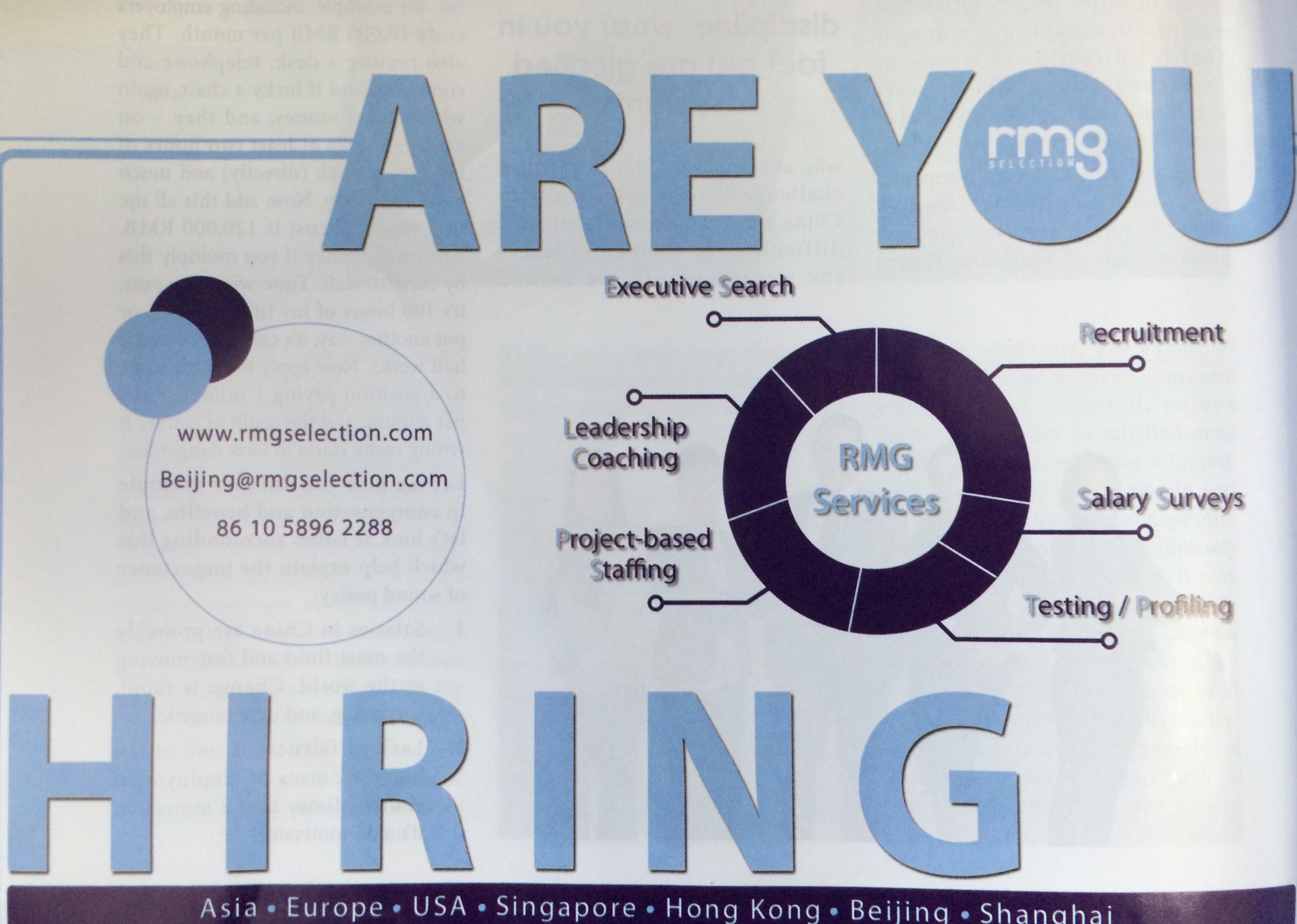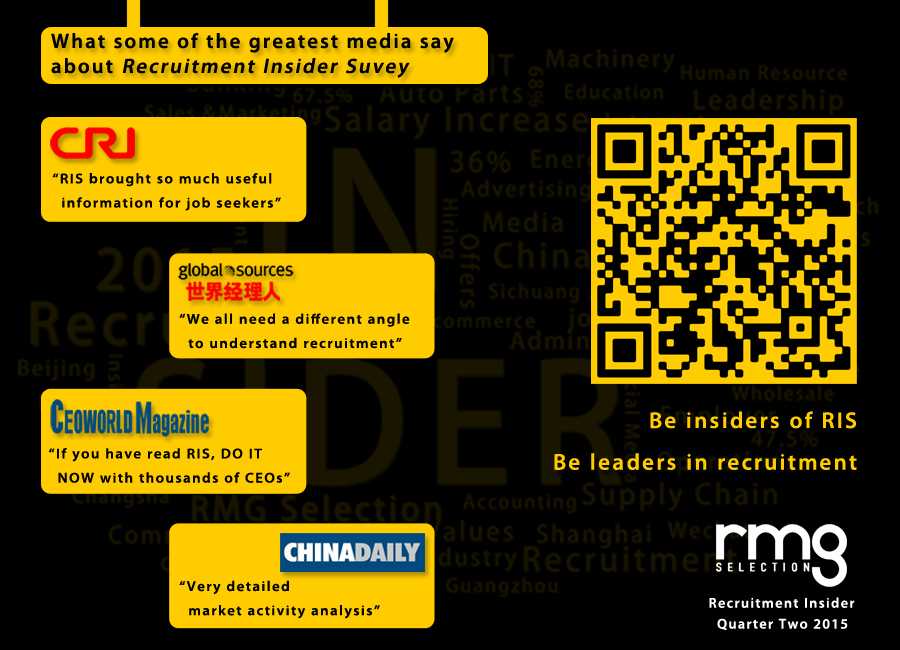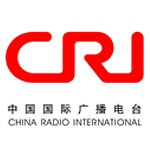
Last month I was sitting in my garden in the UK enjoying the beautiful sunshine and clear air scanning my email messages when I saw a note come through from a client instructing my company to find them the position of “HR & Administration Director”. The fact that giving people instructions as opposed to a polite request, was not really the main source of my bemusement (although symptomatic of what needs to change in the “supplier/receiver” relationship in China) the main source of my eye-raising was the job title.
This article aims to describe one of the issues which wastes billions of RMB a year, causes huge disruption within companies, and contributes to massive churn in white collar labour markets: the confusion of HR and administration professionals. Most companies, including the large ones don’t understand what HR is about. It is a parking bay for a whole host of different tasks including: salaries, personnel administration, hiring, firing, annual reviews, etc. Business strategy – in my view the most important strand of HR – is rarely included.
The difficulty with combining functions like this is that each requires unique, and sometimes opposing skill-sets. For example: administration requires someone who is detail-oriented, enjoys order, and will not be satisfied until organisation and order are achieved. This is who they are as people and they enjoy it. Conversely, people who hire and fire, require completely different traits, some of which may be learned, but most of which are innate: “firers” require resoluteness and compassion; “hirers” need to be out-going, energetic, inspiring, and both require great communication skills. Anyone with a basic knowledge of the DISC assessment profile I have written about previously (DISC = Dominance, Independence, Steadiness, Compliance) will realise that many of these responsibilities are at opposite ends of the behavioural spectrum. An administration person might, for example, be very compliant and steady, whereas a recruiter or a business consultant is likely to be dominant and highly independent.

Talking of the role of business consultant or strategist, especially in China, this role is completely at odds with the way the HR profession operates. The role of the strategic HR professional ( rather than administration) is, put simply, to help the business with their people “issues”. This means that you need to be an adept communicator, a politician, a manager of big egos (often), in your task of guiding and teaching the organisation that better training, managing, communicating with, recruiting, inducting and treating their team members will result in better results. Often this means encouraging a manager that his direction is wrong or needs improvement. This requires dominance and frankly a low level of compliance. This is real HR.
In my experience, foreign companies in China do not understand or value the role of Human Resources professionals. Companies regard the role of administration and HR as a pooled group of assistants of which the cleverest and most bosspleasing get promoted. Most “bosses”, absolutely including the foreign ones, encourage their chosen-one by tempting them with inflated titles and temping salaries, and whether cons ciously or uncons ciously encourage a “yes boss” culture. They do not encourage critique of their ideas, and frankly neither party could handle either the giving or receiving of critique. (I had a very fun session this week with a very bright, “risingstar” of my company where I tried to encourage her to think of three things I needed to improve. We managed one, with the help of my wife, who (correctly) said that I was impatient. The rising-star agreed!)
Rather than treating HR as a serious discipline, what you in act get are glorified assistants, who are taught to obey rather than challenge (I refer specifically to China here). This poses substantial difficulties to companies where the wrong p eopl e a r e t asked with, for example recruitment, or compensation and benefits. The costs of getting a “hire” wrong are well documented and typically amount to ten times (plus plus) the wrong hire’s salary.
Let’s look at an example:
- New western general managers in China tend to make a lot of cultural blunders and mistakes in management. They are promoted because they are experts in their field, be it scientists, accountants, sales people etc, and in the case of the foreign companies, they are the “trusted one” in a foreign land. The one thing they really need is a “people-strategist” who will say “no” to them. This is the one thing they don’t get.
- Mistakes cost money. Let’s use an example from my profession: If I hire a recruitment consultant and they cost me, for example, including employers costs 10,000 RMB per month. They also require a desk, telephone and computer, and if lucky a chair, again which costs money, and they – on average – take at least two hours of my time a week (directly) and much more indirectly. Now, add this all up: in a year, the cost is 120,000 RMB. Not small money if you multiply this by even 10 staff. Time-wise, in a year, it’s 100 hours of my time, directly, or put another way, it’s exactly two and a half weeks. Now apply the same sums to a position paying 1 million RMB per annum, and the result of getting it wrong really starts to look dangerous.
Let me give you another example in compensation and benefits, and let’s look at issues surrounding this which help explain the importance of sound policy:
- Salaries in China are probably the most fluid and fast-moving in the world. Change is rapid, surprising, and unapologetic.
- Lack of fairness is one of the biggest causes of employment churn. Money isn’t a motivator, it’s a de-motivator.
- Therefore, keeping the above two factors in mind, is it:
a. Sensible to delegate to someone who has no experience of designing and devising future proofed compensation and benefits programmes, but happens to wear the label HR Director you have neatly assigned?
b. A good idea to get involved in the above, in partnership with your finance and HR teams, mindful that you (the GM) are the ultimate “HR head”?
c. Hire a compensation and benefits specialist?
Clearly the answer is either b. or c. depending on the size and resources of your company. You would be amazed at how often the reality is that the answer is a.
To refresh: Don’t confuse strategic HR and administration, both are vitally important but they require different qualities.
Encourage critique and ideas from your HR team, it will flourish and you will learn.
Use specialists or get involved yourself – you don’t delegate your tax affairs to your admin manager, why do the same with Human Resources? – Arguably your most important resource.
On a final note, there is a paradox here: Chinese people, in my view, are amongst the most resourceful and capable group of people I have worked with. In my view they have a huge capacity to adapt and absorb, and given the right frame-work it is my belief that they would brilliantly fulfill the real role of an HR professional. The paradox therefore is that it is the foreigners (mainly) that prevent this by treating people as assistants and reinforcing the belief that this is how and what the job should be.

This article is published on Business Tianjin Magazine:
http://t.cn/Rqd9K5S


 Talking of the role of business consultant or strategist, especially in China, this role is completely at odds with the way the HR profession operates. The role of the strategic HR professional ( rather than administration) is, put simply, to help the business with their people “issues”. This means that you need to be an adept communicator, a politician, a manager of big egos (often), in your task of guiding and teaching the organisation that better training, managing, communicating with, recruiting, inducting and treating their team members will result in better results. Often this means encouraging a manager that his direction is wrong or needs improvement. This requires dominance and frankly a low level of compliance. This is real HR.
In my experience, foreign companies in China do not understand or value the role of Human Resources professionals. Companies regard the role of administration and HR as a pooled group of assistants of which the cleverest and most bosspleasing get promoted. Most “bosses”, absolutely including the foreign ones, encourage their chosen-one by tempting them with inflated titles and temping salaries, and whether cons ciously or uncons ciously encourage a “yes boss” culture. They do not encourage critique of their ideas, and frankly neither party could handle either the giving or receiving of critique. (I had a very fun session this week with a very bright, “risingstar” of my company where I tried to encourage her to think of three things I needed to improve. We managed one, with the help of my wife, who (correctly) said that I was impatient. The rising-star agreed!)
Talking of the role of business consultant or strategist, especially in China, this role is completely at odds with the way the HR profession operates. The role of the strategic HR professional ( rather than administration) is, put simply, to help the business with their people “issues”. This means that you need to be an adept communicator, a politician, a manager of big egos (often), in your task of guiding and teaching the organisation that better training, managing, communicating with, recruiting, inducting and treating their team members will result in better results. Often this means encouraging a manager that his direction is wrong or needs improvement. This requires dominance and frankly a low level of compliance. This is real HR.
In my experience, foreign companies in China do not understand or value the role of Human Resources professionals. Companies regard the role of administration and HR as a pooled group of assistants of which the cleverest and most bosspleasing get promoted. Most “bosses”, absolutely including the foreign ones, encourage their chosen-one by tempting them with inflated titles and temping salaries, and whether cons ciously or uncons ciously encourage a “yes boss” culture. They do not encourage critique of their ideas, and frankly neither party could handle either the giving or receiving of critique. (I had a very fun session this week with a very bright, “risingstar” of my company where I tried to encourage her to think of three things I needed to improve. We managed one, with the help of my wife, who (correctly) said that I was impatient. The rising-star agreed!)
 This article is published on Business Tianjin Magazine:
This article is published on Business Tianjin Magazine: 




 In a commercialized era like today, we really need to think about “sell” our uniqueness in our life for a better job, a better status, or simply getting more businesses. How well we are going to sell ourselves sometimes not only depends on the capacity, but on how loud a “brand name” we have. So today we are going to talk about this “name” thing-personal branding.
Ruben de van Boer, senior recruitment consultant of RMG Selection, offers his views on personal branding. As specialized recruitment consultant in the field of logistics and warehousing, Ruben builds up his brand name among friends, candidates and clients gradually. Are you curious about Ruben’s secrets of branding himself to the maximum extent? Then you shouldn’t miss this week’s Career Builder.
In a commercialized era like today, we really need to think about “sell” our uniqueness in our life for a better job, a better status, or simply getting more businesses. How well we are going to sell ourselves sometimes not only depends on the capacity, but on how loud a “brand name” we have. So today we are going to talk about this “name” thing-personal branding.
Ruben de van Boer, senior recruitment consultant of RMG Selection, offers his views on personal branding. As specialized recruitment consultant in the field of logistics and warehousing, Ruben builds up his brand name among friends, candidates and clients gradually. Are you curious about Ruben’s secrets of branding himself to the maximum extent? Then you shouldn’t miss this week’s Career Builder.